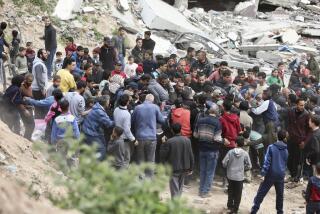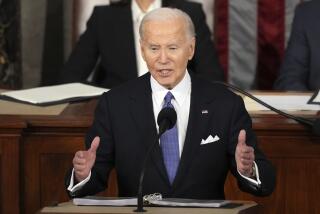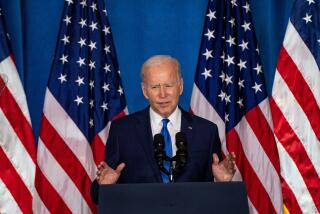In Fiery Speech, Hussein Warns Against Attack
WASHINGTON â In a defiant speech to his nation, President Saddam Hussein warned Thursday that the United States and any other nations that attempted to attack Iraq would face âdisgracefulâ military failure and a massive loss of life that would force them to âcarry their coffins on their backs.â
The Iraqi leaderâs televised address--an appeal to audiences both at home and abroad--was his first public response to the recent growing threat of military confrontation with the United States.
âAll empires and bearers of the coffin of evil, whenever they mobilized their evil against the Arab world or against the Muslim world, they were themselves buried in their own coffin, with their sick dreams and their arrogance and greed,â he said.
The Bush administration dismissed the speech as insignificant, with State Department spokesman Philip T. Reeker calling it âbluster from an internationally isolated dictator, demonstrative yet again that his regime shows no intention to live up to its obligations under U.N. Security Council resolutions.â
Husseinâs words offered insight into the current mood in Baghdad. Despite the tough talk, analysts said, the speech hinted at a new fear within Iraqâs leadership about U.S. plans to oust the regime, as the war of nerves between the two nations heats up.
The speech, delivered on the anniversary marking the end of the 1980-88 war between Iraq and Iran, resonated at three levels, analysts said.
It sought first to evoke what is viewed in Baghdad as an Iraqi victory during the grueling 1980s war, playing particularly to the Iraqi military--arguably the most important element of society in determining whether Hussein can survive a foreign onslaught.
Clad in a suit instead of his usual generalâs uniform, Hussein stressed the survival of his regime through assorted challenges. He boasted that the call to stand up to any aggressor was backed âby everyone confronting the enemies with a gun, a cannon, on a tank, in a plane, or on a naval boat, by millions of men among our troops.â
But, in fact, the military is the big question mark, and his concern about its loyalty is now evident.
âSaddam has been briefed on the content of plans leaked to the press, many of which say explicitly that the military and the tribes will defect and come over to support the United States,â said Judith Yaphe, a former intelligence analyst who is now a senior fellow at the National Defense University in Washington.
The speech played to fierce Iraqi nationalism, with Hussein noting that Iraqis always stood together whenever âthe horns of aggression loomed large against us.â
His remarks were directed to the heart of U.S. strategy in the run-up to a confrontation, analysts said.
âAmerican strategy is to separate Saddam from the Iraqi people, to show the people that they can support Iraq without supporting Saddam. Saddam knows thatâs his weakness, so to the extent he can wrap himself in the Iraqi flag and say, âAn attack on me is an attack on all of you,â that is now his defense,â said Charles A. Duelfer, former U.N. weapons inspector in Iraq and a current visiting scholar at the Center for Strategic and International Studies, a Washington public policy center.
Second, the speech was aimed at the Arab and Muslim worlds--reflecting their historical encounters with the West--in an attempt to prevent them from succumbing to U.S. pressure to provide assistance in confronting Baghdad.
Ignominious defeat âis the inevitable outcome awaiting all those who try to aggress against Arabs and Muslims,â Hussein said. âIf anyone wants to learn from history, he ought to remember this fact and think again. Otherwise he will end up in the dustbin.â
Frequently invoking the Muslim faith, the Iraqi leader said that belief in God always helped the faithful âto prevail over injustice.â
Hussein did not give this speech on Aug. 2, the anniversary of his 1990 invasion of Kuwait, though he has chosen that date for remarks in the past. That war deeply divided the Arab world, with countries such as Egypt and Syria dispatching troops to force an Iraqi withdrawal. Instead, he picked the anniversary of a war against Iran, a non-Arab country that many Arab nations fear.
âHe wanted to avoid the ugly issue of Kuwait, which might remind everyone thatâs what started it all,â Yaphe said.
Finally, Hussein attempted in his speech to divide the U.S. from the rest of the world. While he never specifically mentioned the United States, he made obvious references to âthe enemyâ and âthe forces of evil,â the latter a play on President Bushâs description of Iraq as a member of an âaxis of evil.â
Hussein called on all Iraqis, Arabs and the Islamic faithful worldwide to confront âthe enemy who wants to harm Iraq, with total disregard for God and man, despite all the resilience and resolve with which the Iraqi people have faced this enemy.â And he described the âright courseâ as âdealing with others in peace--and equitable dialogue.â
The White House reacted to Husseinâs speech by calling for greater compliance with the United Nations.
âThe Iraqi government needs to comply with the responsibilities it agreed to at the end of the Gulf Warâ in 1991, spokesman Scott McClellan said.
Those include allowing international inspectors to determine whether Iraq is creating chemical, biological or nuclear weapons. Iraq has barred the inspectors since 1998.
Husseinâs speech came on the eve of talks between the Bush administration and several Iraqi opposition groups to discuss the possible ouster of the Iraqi leader and the steps that would be required to build a new, democratic government.
*
Times staff writer Edwin Chen in Crawford, Texas, contributed to this report.
More to Read
Sign up for Essential California
The most important California stories and recommendations in your inbox every morning.
You may occasionally receive promotional content from the Los Angeles Times.










